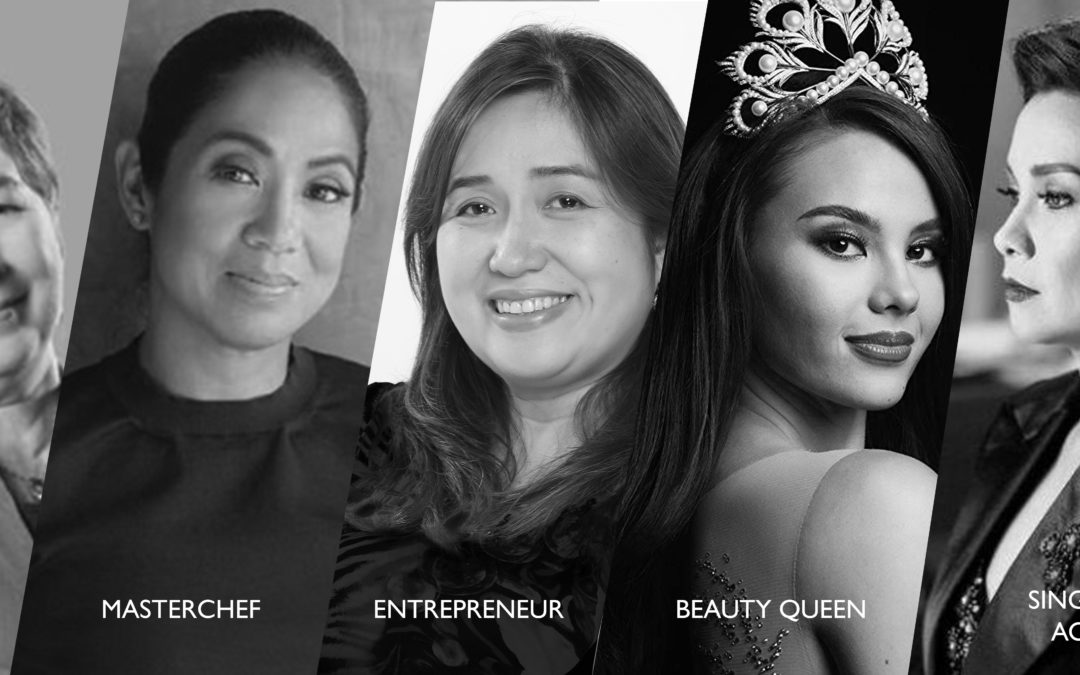
by rossanahead | Mar 9, 2012 | career, children, Education, family, Mari-an Santos, parenting, woman
By Mari-An C. Santos
Our family is not wealthy. My father is the eldest son among eight of a welder and a housewife who worked part time. Growing up, he worked many odd jobs, mostly selling odds and ends, waiting outside a different church every day, depending on whose Novena day it was, e.g. Quiapo, Baclaran, etc. My mother is the daughter of a district school
supervisor and public school principal in Mindanao. They would scrimp and save every last centavo until the next teachers’ salary came from the government, literally making ends meet for five children.
But both my parents value education. My father was a working student all his life and so, it was no wonder that he went into economics. My mother took up nursing at the advice of her grandparents and came to Manila to work. Later, they were both employed by a top multinational corporation, where they met.
My parents worked hard to send me and my sister to a school that they deemed would teach us not only the basic R’s, but also impart positive values that they too shared. We did not always have enough money to “keep up with the Joneses” at the school, but we did manage to have all the basic school supplies and participate in most relevant school activities like field trips and class projects. As a child, I did not fully appreciate why I could not afford to buy a Trapper Keeper or the latest pair of Keds or Reeboks.
It is in hindsight, of course, that everything makes sense. My father was very strict about maintaining good grades all through my grade school and high school years. He forbade watching TV on weekday nights—even going as far as locking up the TV case so that the time was devoted only to studying. When the time came after every quarter of the school year to claim the school cards, I trembled before seeing my grades. If I had a low grade or a lower grade than the previous quarter, my father would sit down with me and find out exactly what went wrong. He was tough, as most Filipino parents are, and put a great emphasis on high grades.
In grade school, I lived up to my potential and was part of what was called the “interdisciplinary classes” from fourth until sixth grade. In our school, we took an exam at the sixth grade to find out if we could go on to high school or stay one more year in grade school. I passed the exam.
In high school, I was placed in the “honors class” where we had to excel in the academic subjects. I dreaded the end of the schoolyear, as inevitably, some of our classmates were transferred to other classes. Thankfully, I graduated as part of the same class, and among the top of my batch.
In college, even though I lived near the university and enjoyed greater freedom, I found that I took with me the drive to excel in my studies. I was a college scholar every semester and I graduated cum laude. I was so proud to have my
parents on stage to award me on graduation day. It was, after all, due to their efforts that I received such an achievement.
Even when I was working, the drive that my parents instilled in me to excel was very strong. I made the most of every opportunity to learn and to be the best that I could be—whether it was as a production assistant or as a segment producer or as a scriptwriter.
When I began to pursue higher education, it was of my own initiative, not at the prodding of anyone else. I felt that I wanted to learn more and more every day. Although I had to abandon what I started when I moved from the capital city, I found more and other ways to learn from new experiences and new people I met in new places.
Now, that I am pursuing a degree with a scholarship, I value much more the good basic foundation that I have—thanks to my parents’ efforts and the education that they helped me achieve. Without such good foundation and records, how would I get a scholarship that would enrich me and fund my day-to-day expenses? That is why I strongly believe that good education is of primary importance in every person’s life, whether we can see it at present or not. The adage is true: a good education is something that can never be taken away from us.
Photo by Alex Samuels on Unsplash

by rossanahead | Mar 8, 2012 | career, children, Education, family, parenting, Rossana Llenado, woman
By Rossana L. Llenado
Today is very special as we celebrate International Women’s Month and the first year anniversary of Smart Super Women.
We started S, as we fondly call it, to serve as a forum for smart super ladies to inspire other equally bright and busy women.
We asked people we admire to share with us their stories.
We asked leaders to share with us the secret of their success. We asked them to trace their roots, to speak to us about their vision, and to share with us their triumphs and tribulations.
We asked parents to share with us how they raise their children. We asked them how they became so strong as they dealt with the challenges of modern parenting. Does your being strong benefit your children? Do you want your daughter to be as strong as you are? These are the questions that we asked of them, the answers of which they gladly gave us.
We asked single successful career women to share with us the choices that they had to make. We asked them to tell us about the joys of freedom and independence and about how they sometimes had to conquer the specter of loneliness.
We asked everybody to share with us the events of their daily lives. What gives them joy? What matters to them, what concerns them, what jolts them into feeling?
By asking these questions, these leaders, parents, and women showed off the brilliance that is their education. Indeed, in one story after another, we saw how a good education proved to be the final touch that spurred a person to excellence and achievement.
This we did for the last 365 days. They wrote. We posted. We shared.
Each essay is a celebration of one woman and of all women.
We hope to bring more inspiring essays in the coming years. And we invite all of you to share your story, so that there will be more Smart Super Women out there.

by rossanahead | Mar 8, 2012 | career, Education, Lyra Pore, woman
By Lyra P. Villafana
I used to edit a two-volume publication on legal costs. Referred to by practising lawyers in Australia, it was one of the most difficult to understand among all the products in my department’s list.
The first time I spoke to the author, she asked: “Are you legally qualified?”
“No,” I said. “I have a bachelor degree in Communication and my background is publishing, not law.”
“I can’t imagine how you can edit this kind of publication.”
Notwithstanding my lack of formal legal education, I forged a productive relationship with the author. I gave her all the support she needed to be able to perform well as an author. In return, she delivered her manuscript on time, picked up the phone and talked to subscribers when I asked her to, and helped me with my product research. The question about the law degree never came up again.
All these years that I’ve worked in legal publishing in Australia, my education in the Philippines has served me in good stead. My training at the Ateneo de Manila University Graduate School of Business has helped me develop commercial acumen, a skill that is becoming valuable among editors these days.
Editors are not just wordsmiths anymore. Rather, we are the commercial owners responsible for the profit and loss of our publications. Even when I was editor-in-chief of Entrepreneur magazine in Manila, I looked at the title in terms of market wants and needs. I managed the editorial process so we could go to press on time—the earlier we could supply the magazine to distributors, the more money we would make on newsstand sales.
I’ve reaped dividends too from my UP Communication degree.
The ability to read and analyze difficult text? My grasp of grammar and punctuation? The confidence to believe that I can learn and engage in meaningful discourse? UP nurtured me in all of these.
There are many other overseas Filipinos like me who have established themselves in their chosen careers. Nurses. Engineers. Accountants. IT professionals. The two things we all have in common: the fortitude to finish our studies and the tenacity to get every job done.
Photo by Daniel Chekalov on Unsplash

by rossanahead | Mar 8, 2012 | career, Education, family, woman
By Paige de Guzman
There’s a love and hate relationship between me and college. One minute I was loving it, then hating it the next. I love vacations. I love lazy days and happy mornings when I don’t have to wake up early to go to school. I love it when I don’t have to sit in the bus in the middle of traffic and end up late for class.
Nevertheless, I did my best. I woke up early, finished my assignments, studied my readings, and aced my classes. Sometimes, I would complain, but always, I tried to do my best. At the time, I always thought of what my parents told me: “It’s for your future.”
And oh, how right they were!
Of course, the realization did not come right away. When I graduated, I went job-hunting, taking tests and doing interviews. At first, it was frustrating. But because I knew exactly what I wanted, I did not lose hope. Today, I am working full time as a publishing specialist while doing part-time work as a writer.
But reaping the rewards of a good education does not stop with getting a good job. A good education reflects on the quality of your work. It shows on how you handle pressure. Aren’t exams, graded recitations, and project deadlines stressful? Well, I’ve realized that they’re almost the same—deadlines in school and deadlines at work. The difference is that you get paid with the latter. That’s when I tell myself, “Thank God, I did my best in school!”
A good education also reflects on how well you relate to people. It shapes into the kind of person that you are. Before college, I was a socially awkward girl who stammered a little bit in class. I suppose, all those graded recitation sessions fixed that.
I might have hated school at one time or another, but looking back, I’m glad I did my best. I know that I wouldn’t be here now if I hadn’t burned the midnight oil.
Photo by Element5 Digital on Unsplash

by rossanahead | Mar 8, 2012 | career, children, Education, family, Jing Lejano, parenting, technology, travel, woman
By Jing Lejano
When we started the Smart Super Women blog exactly one year ago, we never thought that we’d play witness to daredevil feats of adventures. We wanted to hear inspiring stories of mothers, daughters, sisters, warriors, peacemakers, intellects, vamps, homemakers, career rats, readers, adventurers, and dreamers who were going through their everyday lives. But we didn’t think that they’d do so with such daring and gumption.
Take the case of Mari-An Santos, a cum laude graduate of the University of the Philippines. We happily read about her trips to Thailand, when she suddenly revealed that she was packing her bags and moving to Romania! She had received a grant to pursue her Master’s degree in that European country. In her latest entry, she writes, “Studying in a foreign land has not only opened my eyes to the reality that I am a citizen of the world, it has made me appreciate my being Filipino all the more. Even as I learn about other peoples, cultures, and places, I have learned to value home even more.”
A collection of personal essays for and by women, the Smart Super Women blog was created to inspire its readers to tackle everyday challenges with courage and to work for the fulfillment of their dreams with conviction.
Most of the contributing writers are working mothers with school-aged children. They discuss such topics as careers and children, literacy and education, family and friends, and the quest for self-improvement. Because the writers contribute on a regular basis, readers have seen them tackle different challenges, resulting in a very interesting read.
There’s newspaper editor Gina Abuyuan, who never got around to traveling alone when she was single, but who finally had the nerve to roam the streets of Chiang Mai all by her lonesome now that she is “older, tougher, not afraid to tell someone off.” Her latest solo trip had her enjoying the sound of waves crashing at a beach side resort in the provinces. Oh, and may we add that she also recently opened a pub together with her life partner and some friends?
Of course, the adventures aren’t always of the adrenaline-pumping kind. Sometimes, we see these women finding epiphany in a cup of coffee shared with friends, in the few hours they sweat it out in the gym, or in the few minutes they spend with their children as they drive them to school.
But whether they’re raising their kids in the Philippines like writer Ruth Floresca, who’s a work-at-home mom to four boys, or juggling their time between career and home in Australia like editor Lyra Pore, who gets up at five in the morning to bring her daughters to the day care center, these women always find creative ways to make every opportunity a learning experience.
Ruth goes on date nights with her sons as a way of catching up with what’s going on in their lives. She writes, “It’s a continuous process, this getting to know one’s children because they grow up so fast and I don’t want to wake up one morning to find out that I don’t know anything about them anymore.”
Lyra Pore Villafana takes swimming lessons as a way of relaxing from the challenges of living an immigrant’s life. “Life overseas is so different to what we’ve all been used to… But doing something for oneself isn’t unique to Asian moms coping with the stresses of building a new life in a different country.”
Maridol Bismark bombards her sons with questions to learn her way in the digital world. She writes, “I work for an online entertainment portal. Every day, I am exposed to words and phrases that are just starting to make sense to me…I feel like a child lost in a newfangled world, groping for a hand to guide me. Fortunately, the hand belongs to the boy who appreciates everything that I’ve done and will still do for him.”
As these women continue on their journey to live, love, and learn in the modern age, Smart Super Women will be right alongside them, watching their every step, hoping to inspire others to live as fearlessly and as brilliantly as they do.

by rossanahead | Mar 8, 2012 | career, children, Education, environment, woman
By Leslie G. Lee
When I started my senior year in high school, I smugly thought I had my life all mapped out. I was now at the top of the so-called food chain; I had been promoted to editor-in-chief of our school paper from my previous post as features editor; and, like my older sister before me, I planned to study in De La Salle University, majoring in LIA-COM, a fusion of Liberal Arts and Business degrees.
But as usual, life threw me in for a spin when it was time for the college entrance exams.
I was not expecting to be accepted by the Ateneo. Never. At all. My mind was so set on DLSU that it didn’t occur to me that I actually had a fighting chance for a spot in that prestigious university. When I got my admission letters from the two universities, my parents and I had a huge row. I was adamant about La Salle: almost all my friends would be going there, it was only an hour away from home, I’d be receiving a partial scholarship for English, I’d be graduating with a double degree of sorts, et cetera ad infinitum. But my parents were equally firm about the Ateneo—especially my dad, the entrepreneur who wasn’t able to obtain a college degree and wanted his second daughter, his second child, to attend a university that offered a “higher” quality of education.
It took about a month and plenty of parental bribes before I finally caved in and was reluctantly chaperoned and dragged off to pay my confirmation fee at the Ateneo de Manila University.
Now I wonder why I had been so against the idea in the first place.
It’s been more than a decade since I became an Atenean alumni, and it never fails to amaze and astound me each time I remember how much I’d thrived—not just survived—in those four years.
In Ateneo, I was plucked out of my Chinese comfort zone, learned to interact and adapt to true-blue Pinoys, and was exposed to other Filipino traditions. I learned how to drop my Chinese accent, talk Tagalog properly, and speak better English. I was introduced to fascinating topics such as the Holocaust, subjects like Philosophy and Film Theory, and the “science” of deciphering the Bible. I grew to appreciate fabulous short stories such as “The Lottery” and “Beheading of the Heads” and film classics such as Rear Window and Il Postino. And I don’t know if this will seem superficial and shallow to others, but I appreciate the image and reputation that the Ateneo has established, as they have given me access to respectable companies here and abroad.
To continue my litany of praises (and bragging rights) for being an Atenean would take far too much time and space, so let me just say that I will forever be grateful for being “coerced” to study in Ateneo. I love and am proud of being a product of the Ateneo.
Because, you see, I don’t think of education or studying as merely something you do by the book—it’s a way of life. With the right kind of education, you’re taught to deal with people from all walks of life. You study subjects and explore topics that trigger your brain synapses. You discover how you are as a person, your working style and ethics (based on group projects), and how to navigate your way once you’ve left the confines of school and entered the real world.
Good education prepares you for these things, and being a good—if not excellent—student brings you good karma, so to speak. Isn’t it any wonder that almost all companies require a copy of one’s TOR (Transcript of Records) for each application?
Featured Photo Courtesy of ABS-CBN News






